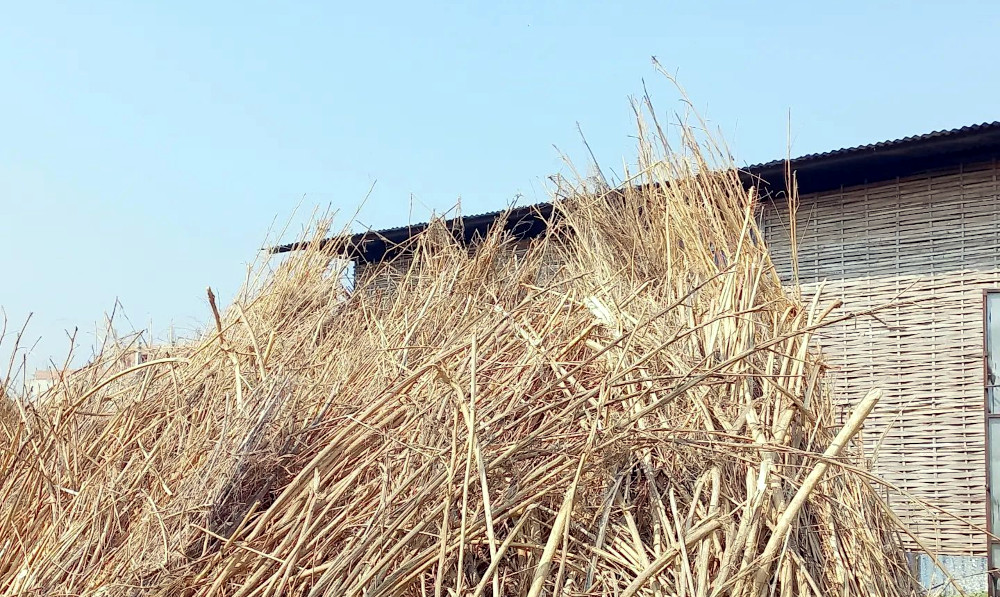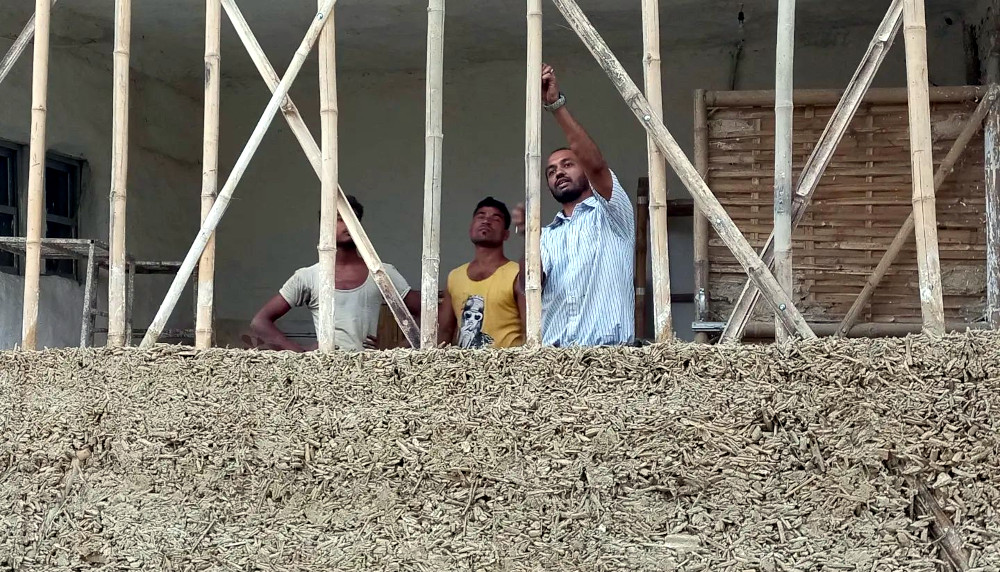Nepal-based startup Shah Hemp
Inno-Ventures (SHIV) is a unique social
enterprise transforming wild-grown hemp, bamboo and other natural
resources into a catalyst for fair employment, economic growth and
climate-change mitigation.
Guided by a mission to harness local resources for global impact, SHIV also
cultivates relationships with local communities to ensure a positive impact and
above-standard working conditions for its employees — who essentially turn local
‘weeds’ into everything
from hemp bags, backpacks, paper, soaps, hemp seed oil and
hempcrete to bamboo mats and furniture.
We spoke with Chief Operations Officer Nivedita
Bansal to learn more about how the
organization combines sustainable farming, waste management, and community
empowerment to build a more environmentally sustainable and socially equitable
future.
How does Shah Hemp Inno-Ventures harvest its hemp?
Nivedita Bansal: We work with the community to harvest and process wild hemp
that grows naturally across our surroundings. Without these efforts, the plants
might be burned or discarded to make way for crop-producing fields. Therefore,
what would otherwise be a natural “waste product” can create housing, handbags
and utility bags while continuously innovating to design new products; we also
process the seeds and oils. We are advancing into certified organic
manufacturing so that our processes can be overseen by a certifying agency.
 Image credit: Shah Hemp Innoventures
Image credit: Shah Hemp Innoventures
What steps does SHIV take to minimize its footprint throughout the supply chain, from cultivation to product distribution?
NB: Most of Nepal primarily depends on China and India to fulfill
its population’s trade needs. One of our goals is to maximize the use of local
natural resources across communities to fulfill the basic needs of the
individuals living within those communities. Our primary raw materials are
sourced from within Nepal, and our primary sales points are also within Nepal —
as, within the country, we focus on building sustainable eco-housing with hemp.
We are in the process of setting up our local store within our manufacturing
grounds while simultaneously showcasing the products of other local and
sustainable businesses.
According to Cambridge University researcher Darshill
Shah,
“Hemp can capture atmospheric carbon twice as
effectively as forests while providing carbon-negative biomaterials for
architects and designers.” A hectare of hemp can absorb 8-15 tonnes of CO2. In
comparison, forests only capture 2-6 tonnes, depending on the type of trees and
region.
SHIV’s product line essentially turns waste into products, but how do you manage your own waste?
NB: Our primary business model is in fact based on managing waste: Wild hemp
is seen as a nuisance to local farmers and is usually just chopped away and
burned. Hemp fibers are fully compostable, making most of the materials we don’t
use for manufacturing indeed compost. Our facility is zero waste; and we
recycle, upcycle or reuse all the inorganic waste — such as bag straps, zippers,
utility attachments and other similar materials utilized during manufacturing.
By communicating with local municipality, neighboring communities and
universities and sharing our methodology — especially our hempcrete building
techniques — we serve
as activists for these sustainable practices.
How does SHIV ensure fair labor practices and worker welfare within its supply chain?
NB: We rely on our relationships with local communities and their leadership
and cultural practices to maintain a positive impact on our employees and
co-create above-standard working conditions and ensure their unique needs are
met. We have implemented practices that benefit our workers, including:
-
Access to healthcare provided by the company through private medical
facilities
-
Access to community gardens and shared food programs
-
Employee upskilling and training
-
Support for employees to start their small businesses
-
We have set up processing and manufacturing facilities in short proximity to
local village communities to mitigate the need for residents to travel to
large, urban centers or migrate.
In addition to the above supports, Shah Hemp pays workers above the local living
wage; therefore, employment with us becomes fully financially sustainable for
our workers.
Our Workers Impact page
provides more details about how we address challenges such as low worker
literacy while actively mitigating human trafficking.
 Image credit: Shah Hemp Innoventures
Image credit: Shah Hemp Innoventures
How does Shah promote social development to help improve conditions outside of its operations and supply chain?
NB: We are active partners with local community
leaders in providing
social-development initiatives. We provide our employees and local community
members with training primarily focused on hempcrete building methods, so that
individuals and families can build safe and eco-friendly living structures on
their own. Additional training includes organic gardening, food production and
skills development — such as transforming art into a marketable product.
Additionally, we advocate for the safe, effective and lawful utilization of hemp
as a manufacturing material and spread knowledge while dispelling myths in
partnership with local and municipal leadership.
How does Shah ensure transparency and accountability in its operations, particularly concerning supply chain practices?
NB: We publicize our Impact
efforts on our website. We have recently launched a video-based accountability
initiative whereby workers for whom literacy is a challenge can receive our
training materials and policies by video. They then film their questions,
consent to short-form employment agreements, their ongoing skills development,
and their expectations of the company. We have explored utilizing blockchain
technology as part of this process to ensure our efforts are transparent while
also protecting worker privacy. We hope to be able to partner with organizations
such as Bluenumber,
Be Slavery
Free, and the
Million
Makers initiative to take these
efforts further.
How does SHIV hope to broaden its efforts to promote social welfare or provide opportunities for marginalized communities?
NB: Shah Hemp Inno-Ventures became a Certified
B
Corporation
as of February 2024. With this certification, we aim to attract significant
retailer partnerships to distribute our products to more parts of the world. We
also hope that our certification will build our credibility in front of
organizations actively working to end human trafficking and that we can forge
more partnerships and create collaborative campaigns.
We also publish impact-related content to our social media with an
“education-first” focus, whereby we share our building and manufacturing
processes online and with communities across Nepal. We seek to draw in customers
by sharing our day-to-day positive impact, such as our regular hempcrete
building workshops publicized on Instagram.
We have developed and abide by a Stakeholder
Engagement
Policy,
which involves the establishment of Advisory Boards that include our customers
and representatives of local communities. We often implement a project-based
stakeholder-engagement group structure; and its representation and scope of work
address the specific needs and intended outcomes related to collaborative work
with customers, suppliers, community organizations, team members and further
stakeholders.
Rather than treating ESG as a box to check and policies to abide by, we create
our own action plans that address real challenges on the ground. We also ensure
that our customers can be proud that the products they purchase represent the
journey we’ve taken together.
Get the latest insights, trends, and innovations to help position yourself at the forefront of sustainable business leadership—delivered straight to your inbox.
Corporate Sustainability Specialist & Consultant
As a corporate sustainability professional, Fatima Fasih is optimistic about a future where businesses are transparent about their impact and motivated to do more good for profit, people and our planet. A graduate of the esteemed MSs Sustainability Management program of the University of Toronto and a GRI-certified professional, Fatima has experience working with several businesses worldwide and guiding them on their sustainability journey. She started her sustainability career working in off-grid Pakistan and assessing the impact of solar technology on rural communities; recently, she founded her own sustainability consulting business, Enviro6. When she's not working, Fatima enjoys painting, traveling, and exploring the Philippines with her husband and 3-year-old.
Published Jul 11, 2024 2pm EDT / 11am PDT / 7pm BST / 8pm CEST